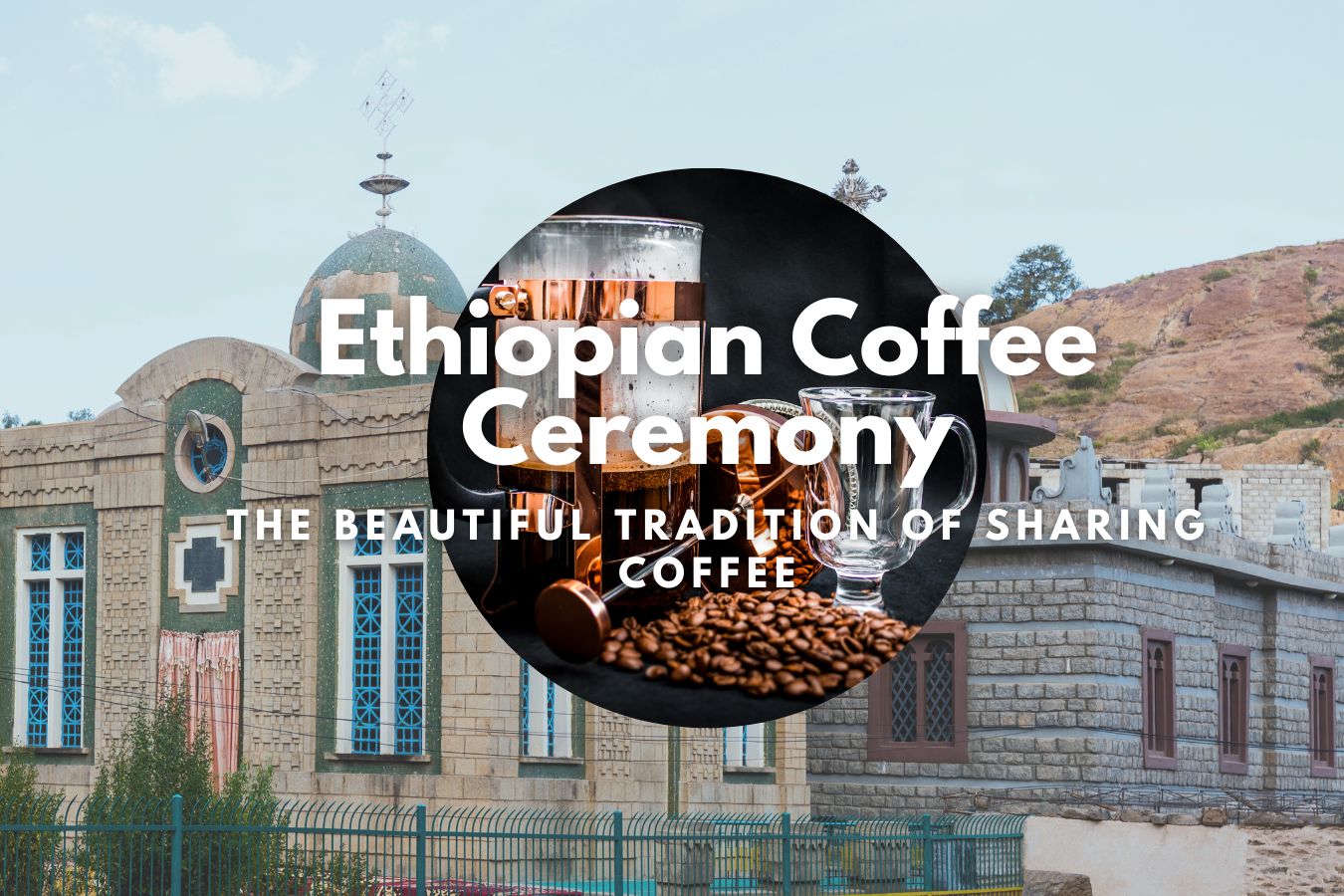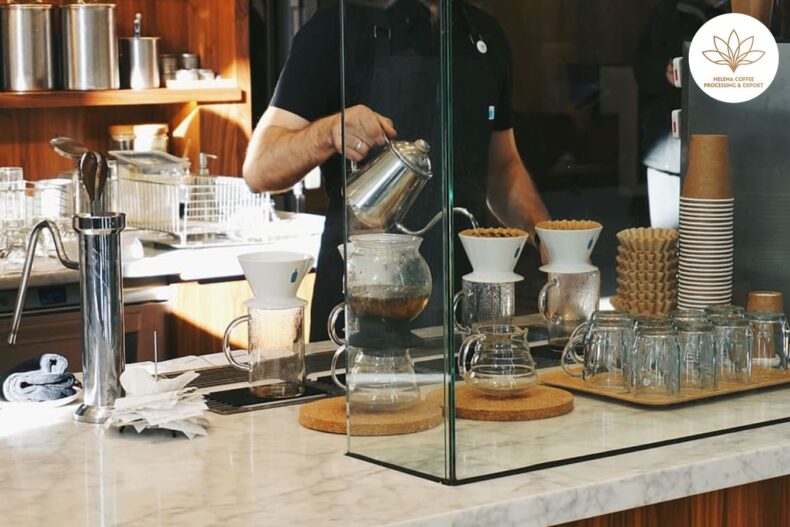
The Ethiopian coffee ceremony is a long-standing tradition deeply rooted in Ethiopian culture. It is a ritualized process of preparing and serving coffee to guests, often involving the entire community. In this article, we will explore the history and significance of the Ethiopian coffee ceremony, its process, and its importance to the people of Ethiopia.
History of Ethiopian Coffee Ceremony
Coffee is said to have originated in Ethiopia, and the country has a long history of growing and consuming it. The coffee ceremony is believed to have originated in the Kaffa region of Ethiopia, where coffee was first discovered. Later, it spread to other parts of the country and became integral to Ethiopian culture.
The coffee ceremony has been practiced for centuries and symbolizes hospitality, friendship, and respect. It is a way for Ethiopians to connect, share stories, and strengthen their bonds.
Process of Ethiopian Coffee Ceremony
The Ethiopian coffee ceremony is a detailed and time-consuming process that involves several steps. The process starts with washing and roasting the coffee beans over a fire. The roasted coffee beans are then ground using a traditional mortar and pestle.
The coffee is then brewed in a traditional clay pot called a jebena. The jebena is placed on a bed of hot coals, and boiling water is added. The coffee is then brewed slowly, with the aroma filling the room.
The coffee is then poured into small cups called finjans and served with snacks such as popcorn, nuts, or bread. The ceremony is often accompanied by traditional Ethiopian music and dance.
Importance of Ethiopian Coffee Ceremony
The Ethiopian coffee ceremony is more than just a way of serving coffee. It is an integral part of the country’s social fabric and a method for Ethiopians to connect. The ceremony is often performed in homes, but it is also common in public places such as cafes and restaurants.
The coffee ceremony is also an important economic activity for Ethiopians. Coffee is one of the country’s major exports, and the coffee ceremony allows Ethiopians to showcase their coffee culture and traditions.
Rituals of the Ethiopian Coffee Ceremony
The Ethiopian coffee ceremony is a ritual involving several steps, each with significance. Here are the actions of the coffee ceremony:
- Roasting: The coffee beans are roasted over an open flame, usually in a jebena clay pot. The roasting process is done slowly to bring out the rich flavors and aromas of the beans.
- Grinding: The roasted coffee beans are smoothed using a mortar and pestle, usually wood or stone. Ground coffee is called Bereka.
- Brewing: The Bereka is then added to the jebena, along with water, and placed on the hot coals to brew. The jebena is often tilted back and forth to create a frothy layer on top of the coffee.
- Serving: The coffee is then filled in small cups called sin. The host will pour the coffee from a height to create a thin stream and allow the guests to enjoy the aroma.
- Drinking: The coffee is sipped slowly, often with a snack such as roasted barley or popcorn.
An Ethiopian coffee ceremony is a social event, and it is customary to invite friends and family to participate. It is a time to relax, chat, and enjoy the company of loved ones.
Significance of the Ethiopian Coffee Ceremony
The Ethiopian coffee ceremony is more than just a way to prepare and drink coffee. It is a symbol of hospitality, friendship, and respect. Here are some of the significances of the coffee ceremony:
- Hospitality: Ethiopians are known for hospitality, and the coffee ceremony reflects that. Inviting guests to the coffee ceremony is a way of showing respect and welcoming them into the home.
- Friendship: A coffee ceremony is a social event that brings people together. It is a time to relax, chat, and enjoy each other’s company. It is an opportunity to build friendships and strengthen relationships.
- Respect: The coffee ceremony is a way of showing respect to the guests. The coffee is served to the guest with the right hand, and it is considered rude to decline the offer. Refusing the coffee is seen as a sign of disrespect towards the host.
- Tradition: The Ethiopian coffee ceremony is an ancient tradition passed down through generations. It is an integral part of Ethiopian culture and is practiced in rural and urban areas.
- Celebration: The coffee ceremony is often used to celebrate special occasions such as weddings, births, and religious holidays. It is a way to honor the event and bring people together.
The Differences Between Ethiopian Coffee Ceremony and Other Coffee Traditions
While coffee is enjoyed worldwide, the Ethiopian coffee ceremony stands out for its elaborate process and its role in Ethiopian culture. Unlike many other coffee traditions, the Ethiopian coffee ceremony involves the roasting, grinding, and brewing coffee beans on-site, creating a unique and flavorful cup of coffee. In addition, the tradition is often performed in homes and involves the entire community’s participation, symbolizing hospitality, friendship, and respect.
In contrast, other coffee traditions, such as the Italian espresso or the French cafe au lait, focus more on the preparation and presentation of the coffee rather than the social and cultural aspects of the ceremony. While these traditions may be enjoyed in cafes or restaurants, they often lack the community spirit and rich history that make the Ethiopian coffee ceremony unique.
The Spread of Ethiopian Coffee Culture to Other Countries
Despite its deep roots in Ethiopian culture, the popularity of Ethiopian coffee has spread far beyond the country’s borders. In recent years, Ethiopian coffee has become increasingly popular globally, prized for its unique and complex flavors.
As a result, Ethiopian coffee culture has spread to other countries, with cafes and restaurants worldwide serving Ethiopian-style coffee and incorporating elements of the Ethiopian coffee ceremony into their traditions. This has helped raise awareness of Ethiopian coffee and its rich cultural heritage while providing new opportunities for coffee growers and exporters.
The Challenges Facing Ethiopia’s Coffee Industry Today
Despite the global popularity of Ethiopian coffee, the country’s coffee industry faces several challenges. One of the biggest challenges is climate change, which has led to unpredictable weather patterns and affected the quality and quantity of coffee crops.
In addition, the coffee industry in Ethiopia is primarily made up of smallholder farmers, many of whom face barriers to accessing credit, technology, and markets. This can make it difficult for them to compete in the global coffee market and earn a fair price for their coffee.
To address these challenges, the Ethiopian government and various organizations have launched initiatives to support smallholder farmers, promote sustainable coffee production, and improve market access. These efforts are crucial to Ethiopia’s coffee industry’s future and to preserving the country’s rich coffee culture.
Conclusion
The Ethiopian coffee ceremony is a beautiful tradition that has stood the test of time. It is a symbol of Ethiopian culture, unity, and community spirit. The ceremony is not just about serving coffee; it is a way to connect, honor guests, and showcase the country’s coffee culture.
The Ethiopian coffee ceremony is an experience that should not be missed by anyone visiting Ethiopia. It is a way to immerse oneself in the country’s rich culture and traditions and experience its people’s warmth and hospitality.
FAQs
Q1. What is the origin of the Ethiopian coffee ceremony? A1. The Ethiopian coffee ceremony is believed to have originated in the Kaffa region of Ethiopia, where coffee was first discovered.
Q2. What is the significance of the Ethiopian coffee ceremony? A2. The Ethiopian coffee ceremony symbolizes the country’s cultural identity, unity, and community spirit. It is also a way to honor guests and show them respect.
Q3. How is the Ethiopian coffee ceremony performed? A3. The Ethiopian coffee ceremony is a detailed process that involves washing, roasting, grinding, and brewing coffee in a traditional clay pot called a jebena. The coffee is then served in small cups called finjans and accompanied by snacks, traditional music, and dance.
Q4. What is the importance of the Ethiopian coffee ceremony to the country’s economy? A4. Coffee is one of Ethiopia’s major exports, and the coffee ceremony is an opportunity for Ethiopians to showcase their coffee culture and traditions, which helps to promote the country’s coffee industry and boost the economy.


